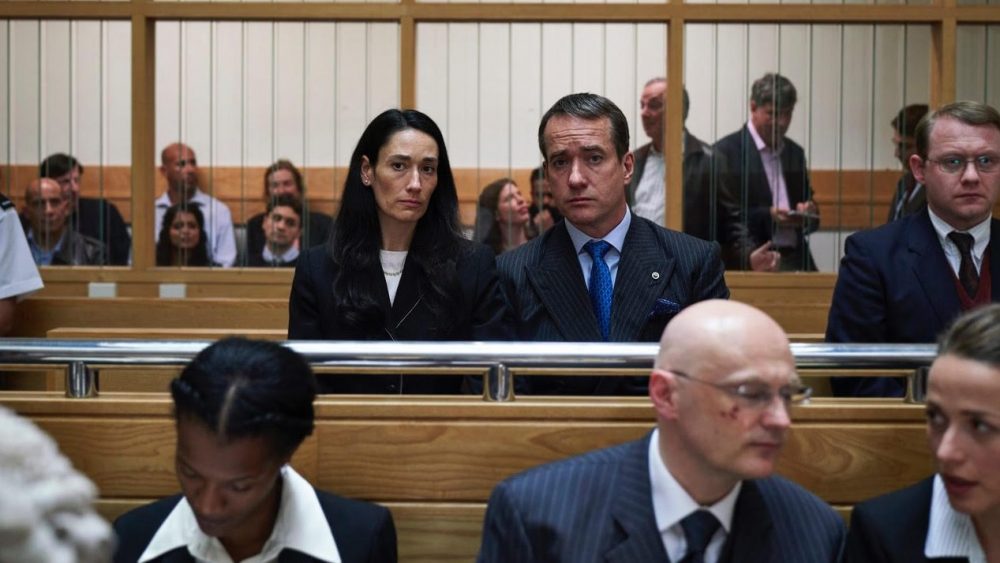‘Quiz’ with Matthew Macfadyen, Michael Sheen and Sian Clifford: TV Review
By Caroline Framke
LOS ANGELES (Variety.com) – Deep into the second episode of “Quiz,” a roomful of frustrated TV executives face some existential questions after watching a man seemingly bumble his way to winning the million pound jackpot on their fledgling hit, “Who Wants to Be a Millionaire?”. Did he cheat? Does finding loopholes in their system actually count as cheating? Is cheating on a game show technically, legally a crime? But again, and most importantly: did he cheat?
This question haunts “Quiz,” James Graham’s 3-episode series about the real life case of Charles and Diana Ingram, a married couple whose time on “Who Wants to Be a Millionaire?” eventually resulted in charges of deception and conspiracy. (They maintain their innocence to this day.) And yet, “Quiz” pointedly isn’t about finding the “truth” of the matter. Instead, it unravels the human desires, neuroses and outright stubbornness that made “Who Wants to Be a Millionaire?” such a massive hit in the first place. Director Stephen Frears (“Dangerous Liaisons”) locks into a propulsive rhythm familiar to anyone who’s seen a heist film: tense and twisty, sometimes to a consciously clever fault, but more often to slyly ruthless effect.
Charles (Matthew Macfadyen) and Diana (Sian Clifford), to paraphrase their eventual opposing counsel, seem like a perfectly pleasant middle-aged, middle class British couple. Charles, an affable major in the army, is gently bemused by Diana’s dedication to quizzes and trivia, a passion she shares with her brother, Adrian (Trystan Gravelle). It’s no surprise that Diana and Adrian become obsessed with “Who Wants to Be a Millionaire?”, the nation’s biggest quiz show ever, hosted by veteran presenter Chris Tarrant (an unrecognizable Michael Sheen) with an almost maniacal gleam in his eye. But the lengths to which they go in order to best the deceptively simple game bring out a side of them all that nevertheless comes as a bitter shock to the system.
Clifford, as she did on “Fleabag,” brings a brittle resolve to Diana that makes her compelling even when Graham’s script doesn’t quite know what to do with her. (Adrian, the family’s purest obsessive, gets the more clearly defined version of her storyline, which veers into comic absurdity more than any other on “Quiz” as a whole.) Macfadyen’s Charles is an even softer version of his “Succession” character, and perhaps the show’s closest thing to a truly sympathetic figure. Watching this “truth is stranger than fiction” story, Charles’ growing unease with the frenzy surrounding “Who Wants to Be a Millionaire?”, even as he himself ends up in its hottest seat of all, is visceral and deeply relatable.
While the outcome is beyond what they could have predicted, the Ingrams’ driving need to win is exactly what “Who Wants to Be a Millionaire?” was (quite literally) banking on. While “Quiz” is interested in how Charles and Diana got in so far over their heads, it never comes as alive as when it’s following the team of television producers that lured them there. From conception to controversy, show creators Paul Smith (Mark Bonnar) and David Briggs (Elliot Levey) steer the “Who Wants To Be a Millionaire?” ship with both grim determination and unwavering enthusiasm. Everything about their show was done with attention not just to what makes a quiz compelling, but the psychology that keeps people trying to win them. The idea of someone cheating their system — or, as they learn with dawning horror, many people cheating their system — is as offensive to them as it is unfathomable. Bonnar is especially good as Paul, first flush with the power to mentally torment a new generation of contestants, then slack with disbelief as his supposed puppets start turning the tables back on him.
The first two episodes appear to chart how and why the Ingrams might have cheated their way to the top. (That Charles won the day before September 11, 2001 is inevitably mentioned, but unfortunately as more of a formality than anything else.) The third, which takes place in and out of the courtroom that would eventually render the crucial verdict, flips that structure on its head, disorienting the audience to mirror the experience of anyone trying to decipher the case. “We can project guilt back onto an event that was, in fact, perfectly innocent,” the Ingrams’ defense attorney (an electric Helen McCrory) insists to the jury. “I’m asking you all to try and resist a more entertaining falsehood in favor of a less extraordinary truth: that Major Ingram simply knew the answers to those questions, and that’s why he got them right.”
With that, “Quiz” goes back and presents an alternate version of events it’s already portrayed, showing us all the ways in which editing a story to better fit a narrative might transform it completely. It’s a risky gambit, and one that frankly works better on a second viewing when you can better appreciate all the winks Graham layered in from the start. But when it does come together, “Quiz” is as compelling as the show that first inspired it.
“Quiz” premieres May 31 at 10 pm EST on AMC. 60 mins. (3 episodes; all reviewed.)

